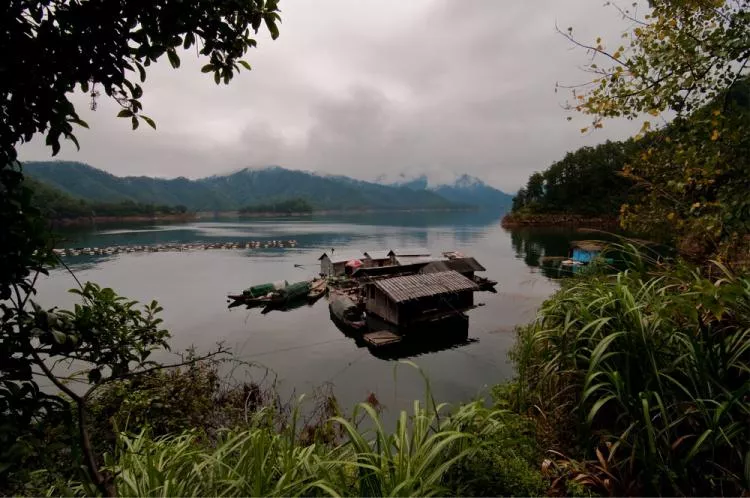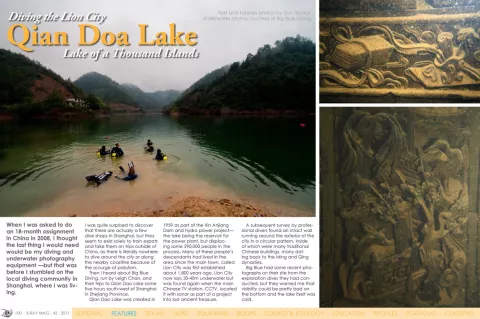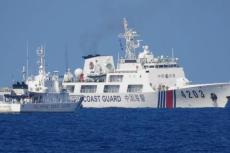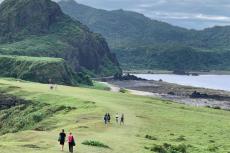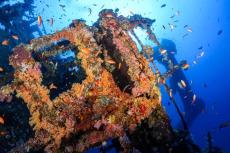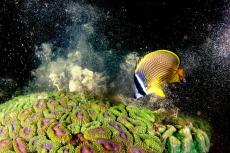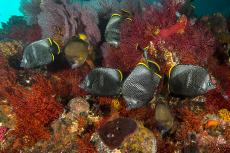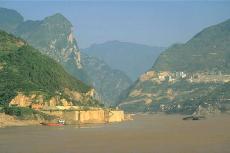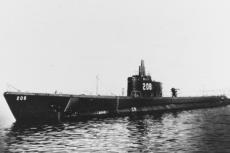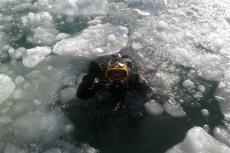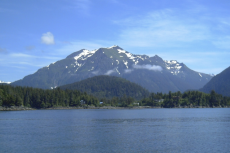When I was asked to do an 18-month assignment in China in 2008, I thought the last thing I would need would be my diving and underwater photography equipment —but that was before I stumbled on the local diving community in Shanghai, where I was living.
Contributed by
I was quite surprised to discover that there are actually a few dive shops in Shanghai, but they seem to exist solely to train expats and take them on trips outside of China, as there is literally nowhere to dive around the city or along the nearby coastline because of the scourge of pollution.
Then I heard about Big Blue Diving, run by Leigh Chan, and their trips to Qian Dao Lake some five hours south-west of Shanghai in Zhejiang Province.
Qian Dao Lake was created in 1959 as part of the Xin Anjiang Dam and hydropower project—the lake being the reservoir for the power plant, but displacing some 290,000 people in the process. Many of these people’s descendants had lived in the area since the main town, called Lion City was first established about 1,800 years ago. Lion City now lays 30-40m underwater but was found again when the main Chinese TV station, CCTV, located it with sonar as part of a project into lost ancient treasure.
A subsequent survey by professional divers found an intact wall running around the exterior of the city in a circular pattern, inside of which were many traditional Chinese buildings, many dating back to the Ming and Qing dynasties.
Big Blue had some recent photographs on their site from the exploration dives they had conducted, but they warned me that visibility could be pretty bad on the bottom and the lake itself was cold.
Undeterred, I signed up for the next trip and arranged to bring all my dry suit diving gear, plus my camera gear, back with me to Shanghai, and one Friday night in September 2008, we were off in the Big Blue bus for a weekend of adventure!
Getting there
Six at night is not a great time to be trying to get out of Shanghai, and it seemed to take hours to get onto the new freeway heading south to Hangzhou. We stopped at the last service station before we left the freeway and headed west for Qian Dao, which signalled the change from modern China, with its idiosyncratic versions of western facilities, to the “real China” (read poor, but very interesting).
We did manage a couple of beers and a snack at the service station though, and then it was back in the bus for another couple of hours until we got to the edge of the Qian Dao National Park and our hotel for the night.
Five hours sleep later, it was up again, and after a quick local breakfast, we were back on the bus making our way to catch the ferry that would take us across the lake and to the town nearest to the site of the submerged Lion City.
The ferry journey was quite memorable because the lake with its 1,078 large islands and a couple of thousand smaller ones is really very scenic. From the ferry, we got to our one-star hotel (the best in town—seriously!) and checked in, so we could dump all non-diving related gear and head for the dive site.
From the hotel, it was a 20-minute drive to the lakeside area where we were to kit up and, for those of us who were diving on the Lion City, board the “dive boats” to take us out on the lake.
Diving
The area we were using to kit up looked like it would eventually be the driveway to a well-heeled local’s weekend lakeside retreat. The dive boats were local fishing boats, who are apparently taking advantage of the laws of supply and demand, to charge very high rates to use them because there is simply no alternative.
The rest of the weekend’s participants were using the trip to Qian Dao lake to complete certification dives and exercises from the shore area.
Those of us who were diving the Lion City boarded the dive boats and chugged out to the dive site, guided by Leigh Chan of Big Blue Diving and his GPS. It was very peaceful out on the lake, almost serene in a sense, because apart from a large ship about a kilometer away, we were the only people out there.
When we arrived at the dive location, we were given a good briefing by Leigh and warned that the visibility may be quite bad, then it was into the water and, after a quick OK all round, we started our descent. At ten meters, I could tell that this was going to be quite an interesting dive, as it was going dark rapidly. At about 20m, I was no longer able to see my gauges, and shortly after my descent halted, I landed in what felt like deep and very soft silt.
Zero visibility
At that point in time, I have to say that I was a little concerned—I appeared to have zero visibility, my buddies had disappeared during the descent, I was a very long way from any possible support and I was wondering how to explain all this to my wife, should I ever see her again.
I managed to turn the light on one of my strobes, and by manoeuvring the strobe right next to my face and holding my gauges very close to my mask, I was able to see that I was at 28m depth. My immediate thoughts were not entirely positive, but I thought follow the rules and wait for a minute or two to see if my buddies find me.
What I should have done, given the fact that I had brought my underwater camera gear all the way from Australia to photograph Qian Dao Lake, was take a photograph—but at that point in time, my self-preservation instinct had overcome any creative impulse!
But let me recreate the scene with the following “artist’s impression”: I subsequently returned safely to the surface and did another two dives that day, the second being a complete replication of the first but without the camera, and the third, a kind of navigation exercise following a bearing Leigh provided to get us at the Lion City. I was diving that time with a nice lady from Canada who suggested we hold hands on the way down to avoid the inevitable separation.
On arrival back down on the lake bottom, we commenced the navigation exercise—which was not easy in almost zero visibility—and after about five minutes of following the bearing we literally bumped into a brick wall. Carefully moving sideways down the wall, we found a corner and carried onwards on the bearing, only to suddenly realise that we may well be inside a building!
It was at that point in time we managed to signal to each other that we should go up and very carefully started our ascent hoping to hit a roof or other obstruction.
Within 5m, we knew that our path to the surface was clear, and to great relief, made a controlled ascent and safety stop at 5m before getting back to the boat in general agreement that the diving was over for the day and for me—well that was it for the whole weekend, as I saw no enjoyment in doing it again.
On the boat on the way to back to shore, it became obvious why the underwater visibility was so bad. The fishermen explained that the large boat in the distance was actually a dredger—no wonder it was zero visibility on the bottom!
Afterthoughts
While the diving part of the weekend trip to Qian Dao Lake was memorable for its challenging nature, it was not the most enjoyable set of dives I have ever done. However, the evening spent at the hotel and the drive and ferry trip back to Shanghai were quite remarkable.
It was late afternoon by the time we left the lake on Saturday, and it was starting to go dark. As we drove back to the hotel, we noticed that there were no lights on in town, and when we did get to the hotel, it was without a single light on. Apparently, power cuts are quite common in this area, as there is an overall power deficit, so the lights are turned off in the remote locations to allow them to stay on in the large cities of Shanghai and Hangzhou. However, my thoughts were more on how we would get dinner if there was no power?
It turned out that the hotel kitchen staff were able to produce an excellent multiple-course meal by candlelight using charcoal braziers to cook the food. The only negative being that the beer was warmish, but after a couple of them, it did not seem to matter too much!
Altogether the trip to Qian Dao rates as one of my most unusual ones ever, and yes, I would go again, but I would want to know if that dredger was still operating on the lake first. ■
Asia correspondent Don Silcock is based in Bali, Indonesia. For extensive location guides, articles and images on some of the best diving locations in the Indo-Pacific region, visit his website at: Indopacificimages.com.

